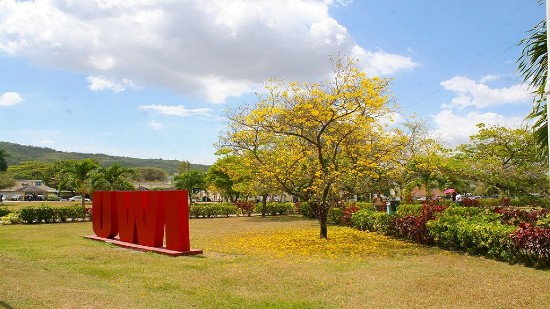PORT OF SPAIN, Trinidad – The St. Augustine campus of the University of the West Indies (UWI) while it has for now taken a decision that it will not mandate staff and students to be vaccinated against the coronavirus (COVID-19 pandemic, its position may change based on if the matter is legislated or pronounced upon by the Courts.
 In an email sent to staff and students, Pro Vice-Chancellor and Campus Principal, Professor Brian Copeland, said given the ongoing public debate on COVID-19 vaccination, the campus had taken the position that, until such time as the matter is legislated or pronounced upon by the Courts,” we will not be mandating staff members nor students to vaccinate.
In an email sent to staff and students, Pro Vice-Chancellor and Campus Principal, Professor Brian Copeland, said given the ongoing public debate on COVID-19 vaccination, the campus had taken the position that, until such time as the matter is legislated or pronounced upon by the Courts,” we will not be mandating staff members nor students to vaccinate.
“However, it is to be noted that non-national students and staff must demonstrate to immigration officials that they are fully vaccinated with a World Health Organization (WHO) approved vaccine in order to enter the country. “
He said the duty of the campus management is to ensure the safety, health and welfare at work of all its employees and to provide and maintain a workplace that is free of known hazards.
“We encourage all staff and students to be fully vaccinated against COVID-19. The data clearly shows that the non-vaccinated remain most vulnerable,” Copeland said.
“WHO-approved vaccines are now widely available throughout the country and have been shown to provide an excellent defense against the COVID-19 virus. The more members of our community who are vaccinated, the greater chance we have of suppressing the COVID-19 virus and the production of mutations. This is also the swiftest path to a full return to campus,” he said.
Copeland said that one exception is the case of the Halls of Residence, where “only fully vaccinated students, whether nationals or non-nationals, will be allowed to stay.
“In any event, non-national students would have to be fully vaccinated with a WHO-approved vaccine in order to enter the country to take up study,” he said, adding that only two halls of residence will be open for the arrival of residents from August 29.
“Although there remain a few details that need to be worked out, there is agreement on the need to do all that is necessary and possible to ensure that staff and student safety is of the highest priority. For staff, details will be included in a revised Return to Work Policy which will be shared in the near future,” he said.
The Trinidad and Tobago government has said it has no intention at the moment of implementing a mandatory vaccination policy even as it urged citizens and residents here to fully participate in the national vaccination program, allowing for persons to decide which vaccine they would prefer to take.
Trinidad and Tobago has so far recorded 1, 208 deaths and 42, 582 positive cases of the virus and the government has signaled its intention to extend a state of emergency (SOE) by a further three months when the current SOE ends on August 29.
In his statement, Copeland said that the UWI has had to treat with the challenge of the COVID-19 pandemic for almost 18 months and the resilience that the campus has shown has been inspiring.
“I thank all members of staff who have continued to diligently serve our student community. To our students, your perseverance, despite the many challenges over the past months, is commendable,” he said, adding that the plans for the 2021-22 academic year will “continue to be guided by national protocols and the Public Health Regulations.
“Likewise, our planning and position on matters for the new academic year is the result of careful planning, consultation across campus management and engagement with our incident management team (IMT), unions and student leaders,” he added.
The new academic year will begin on August 29 and Copeland said that given the current uncertainty around the pandemic, the online delivery of classes will continue for Semester I.
“However, Faculties have been asked to deliberate on the arrangements for labs, field exercises, research and any other activities that absolutely require an on-campus or in-person presence. This assumes the cessation of the State of Emergency and the appropriate approvals from the Ministry of Health.
“Of course, all COVID-19 protocols: physical distancing, sanitizing, mask-wearing, temperature testing and attendance logging, must be observed. Further, Faculties are asked to be flexible in the scheduling of program activities to minimize the clustering of students on Campus. Faculties are also asked to coordinate with the library to make arrangements for safe access by research students,” he said.


